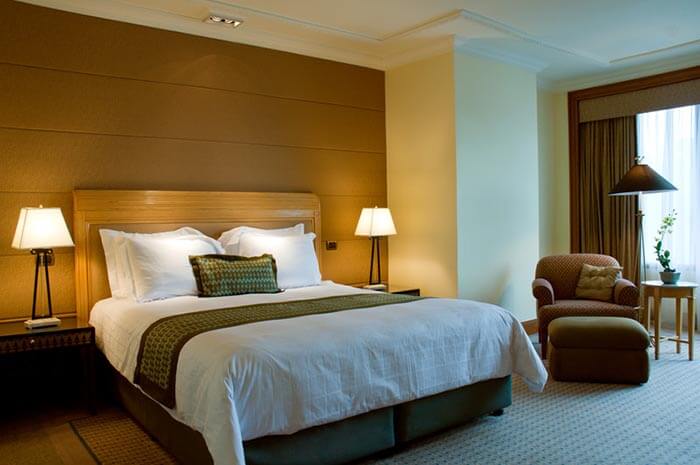
The history of hotels and the hospitality industry has been recorded as far back as biblical times when Mary and Joseph arrived in Bethlehem during the census. As the Bible depicts, Mary and Joseph were refused accommodations because there “was no room at the inn.”
Since the beginning of time, people have travelled for commerce, religion, family, health, immigration, education and recreation.
Early Origins: From Inns to Hospitality
As cited by Texas Tech University, the word “hospitality” comes from the Latin root meaning “host” or “hospice.” Early forms of accommodations resembled more of a bed-and-breakfast experience, where private homes opened their doors to travellers. Most, unfortunately, had poor reputations. The influence of the Roman Empire saw the emergence of inns and hotels catering to pleasure travellers, marking a significant shift in hospitality services.
The First Official Hotel Accommodation
The history of hotels includes significant landmarks such as the establishment of the first recorded inn in America in 1607. This paved the way for subsequent developments, including the opening of the first publicly held hotel, the City Hotel, in New York in 1792, and the debut of the first modern hotel, the Tremont, in Boston in 1809. The hospitality landscape continued to evolve with the introduction of the first business hotel, the Buffalo Statler, in 1908.
From there a surge of hotels flooded the USA and the rest of the world with prominent names such as Radisson, Marriot and Hilton.
The first official ‘oldest' hotel in the UK
‘Apparently' the title of the first official hotel in the UK goes to The Royal Clarence Hotel in Exeter – which burned down in 2016 – and was the first establishment to officially use the French word “hotel”.
Types of Hotels: From Budget to Luxury
Hotels (as well as other forms of accommodations) are generally segmented by the type of hotel services and amenities offered, catering to various travellers' needs and preferences. They can be categorised based on services, amenities, and price ranges. Here's a breakdown of common hotel types:
Budget hotels
Budget hotels offer clean albeit simple rooms that provide the basics of places to sleep and shower. Usually, budget hotels are designed for travellers looking to maximize their funds and minimize expenses. Prices can range from £50 per night to £75 per night in the UK and $50 to $80 in the USA. This is largely dependent on location. For example, in large US and European capitals, hotel budget prices will vary in peak and off-peak times.
Business hotels
Tailored to meet the needs of business travellers, these establishments provide essential amenities with what business professionals would consider necessities; such as high-speed internet connections, workspace areas, comfortable beds, irons and ironing boards, coffee makers, complimentary newspaper delivery and hairdryers. and convenient access to transportation hubs. Rates can range from £80 to £250 per night.
Business hotel facilities
Depending on the type of business hotel, it can offer an in-house restaurant, bar, exercise room and shuttle service to nearby airports. Limit concierge assistance is often included as well as room service, laundry and dry cleaning and wake-up calls.
Luxury hotels
Luxury hotels are in a class of their own as they offer an exceptional level of hospitality with opulent decor, personalised concierge services, fine dining restaurants, and spas. The accommodations at these hotels are designed to impress and thoroughly pamper guests.
The Luxury Experience: Setting New Standards
In today's competitive market, luxury hotels face the challenge of exceeding guest expectations. With discerning travellers expecting unparalleled service and experiences, these establishments are striving to offer a lifestyle experience equal to, or better than, what guests have become accustomed to at home. Moreover, luxury hotels aim to create memorable stays for their guests by providing personalized, unique and unforgettable experiences.
Luxury hotel amenities and prices
These hotels are known for providing top-notch amenities and services to their guests. They offer full-service day spas, five-star restaurants with world-renowned chefs, ballrooms, spectacular pools, golf packages, and unmatched guest services. Furthermore, luxury rooms come with all the amenities found in business-class hotels as well as additional perks such as in-room safes, goose-down comforters and pillows, marble showers and tubs, larger rooms, separate sitting or living areas, and fog-free bathroom mirrors.
However, the rates for hotels can vary greatly depending on location and proximity to popular events and attractions, starting from around £150 per night and going up to an astonishing £20,000 per night in some cases.
Choosing the Right Hotel: Factors to Consider
Selecting the perfect hotel involves considering various factors, including location, amenities, and personal preferences. Whether travelling for business or leisure, travellers utilise online booking websites, search online review platforms and social media recommendations to make informed decisions.
Business mixed with personal accommodation
There are other classifications of hotels, however, most will fall into one of these three or a combination of these three. With the lines between business and personal becoming more blurred, many entrepreneurs and business executives will attend conferences or embark on business trips with family in tow. Hotels are aware of this common occurrence and have become adept at providing facilities and services that both business and recreational travellers enjoy.
Hotels that cater to weddings
More hotels are now offering facilities for couples to be married in. Some are luxurious and others a little more basic. However, depending on your budget you can petty much find a perfect wedding venue that will cater to the couple's exact needs.
UK Hotel Star Rating system
Because of the diversity of hotels a rating system, based on stars, was created. However, rating systems don't all carry the same definitions. For instance, in Britain, the Automobile Association (AA) regularly reviews and rates facilities on a scale based on one star to five stars. The ratings reflect specific written standards set forth by the AA. Travellers who are familiar with this system will know what to expect when booking a reservation at a hotel rated on this scale.
But in the United States or Latin America, the rating systems (if they exist) are widely scattered and unorganized. The same applies to most online travel booking sites that apply their own “star” system, which is not related to the AA.
Personal recommendations are the best way to choose the right hotel
If the facility is unfamiliar, rather than rely on a rating system that could be unfounded, look to online review sites for help or ask friends or business associates for recommendations.
Social media recommendations
On social media sites such as Facebook, X (formerly Twitter), Bluesky and Instagram, someone will have something to say about a particular hotel. Travel social networking sites like Foursquare/Swarm where travellers will leave a review about a specific service or amenity in a hotel or restaurant are always worth reading.
Google Maps reviews are another rich source of information about a hotel or venue. Look at the user photos and reviews.
Top 20 5-Star Hotels Worldwide
Here is our curated list of 20 exemplary 5-star hotels renowned for their unparalleled luxury and exceptional service:
-
-
- The Ritz-Carlton, Kowloon, Hong Kong
- Four Seasons Resort Bali at Sayan, Indonesia
- Burj Al Arab Jumeirah, Dubai, UAE
- The Peninsula Paris, France
- The Plaza Hotel, New York City, USA
- Emirates Palace Mandarin Oriental, Abu Dhabi, UAE
- The Langham, London, UK
- Rosewood Beijing, China
- Mandarin Oriental, Bangkok, Thailand
- The St. Regis Florence, Italy
- Aman Tokyo, Japan
- The Savoy, London, UK
- The Waldorf Astoria, Beverly Hills, USA
- The Oberoi Udaivilas, Udaipur, India
- The Peninsula Shanghai, China
- Belmond Hotel Caruso, Ravello, Italy
- Park Hyatt Sydney, Australia
- The Gritti Palace, Venice, Italy
- Baur au Lac, Zurich, Switzerland
- Soneva Jani, Maldives
-
History of hotels
From their humble beginnings in spare rooms of private homes to the extraordinary heights of luxury and service, there are various types of accommodations available for travellers. Whether you are looking for budget-friendly options or indulging in the pinnacle of opulence, you can find your ideal haven to cater to your needs. This can be the defining point in a holiday or business trip, ensuring that you have a comfortable and fulfilling stay.
This article was originally published on SearchandGo.com in March 2005 and updated in February 2024.






